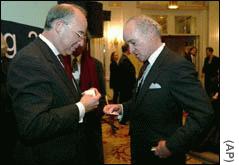|
Economists split on recovery
|
 |
January 31, 2002: 4:43 p.m. ET
Many look for U.S. to lead, but some urge other nations to share the load.
|
NEW YORK (CNN/Money) - Economists attending the World Economic Forum's annual meeting in New York were divided Thursday about the prospects for the U.S. economy and its role in the global economy.
While most agreed that the United States will lead the world out of its current malaise, at least one economist declared that the rest of the world has to stop relying on America to drive its economic growth.
On one side of the debate were those such as Conference Board chief economist Gail Fosler, who thinks the U.S. economy is out of its recession and will return to growth this year.
"November 2001 will be viewed as the trough" of a recession that economists at the National Bureau of Economic Research said began in March, Fosler said.
| |

|
|
Jacob Frenkel, left, president of Merrill Lynch International, exchanged business cards with Henry Kravis, financier and founding partner of Kohlberg Kravis Roberts & Co., during the World Economic Forum at New York's Waldorf-Astoria hotel. | |
"This in some terms has been one of the mildest recessions on record," Fosler added, "but it has been a severe recession by business standards and by the standards of the industrial sector."
A cutback in business spending following the boom of the late 1990s led to the recession, and business outlays will lead the recovery, Fosler said. She sees a rebound in 2002 for corporate profits, which will be fed by higher productivity.
Click here for Stanley Fischer's economic outlook
Fosler's view is likely the consensus among economists, but some, like Morgan Stanley chief economist Stephen Roach, disagree, saying the high level of corporate and consumer debt will throw cold water on a recovery.
"The recession is not over," Roach said. "We will probably have a 'double dip,' another downturn, by spring."
U.S. gross domestic product (GDP), the broadest measure of the economy, shrank in the third quarter, but grew unexpectedly in the fourth, according to a report Wednesday by the Commerce Department. Most economists expect growth, however weak, to continue in 2002.
The size and strength of the recovery has become a political issue. If economic weakness continues, then momentum could build for passage of the stimulus package sought by President Bush and other Republicans. Economists who think the recovery is on its way think the time for a stimulus package has passed.
"Using fiscal resources in that way, especially since we're moving into deficit spending [by the U.S. government], is ill-advised," Fosler of the Conference Board said.
Roach was also adamant that the rest of the world would not be able to grow on its own without serious structural reform, especially if U.S. economic weakness continues, dragging down the dollar and hurting other countries' ability to export goods.
"The world has got to figure out another way to grow," he said. "America can't do the heavy lifting any longer."
Merrill Lynch International President Jacob Frenkel agreed that Europe and Japan, the biggest economies after the United States', were "less flexible" than the U.S. about making necessary economic reforms. But he disagreed that the U.S. economy was set for more weakness.
"It's still the locomotive of the world," he said. "Like Wagner's music, it's better than the way it sounds."
The economists didn't think the collapse of Enron Corp. would have a direct impact on the global economy, but it could worsen an already difficult environment for business lending and spending.
"I wouldn't call it Enron contagion, but it certainly does undergird the sense of risk aversion already in place," Fosler said, creating "an impediment to global liquidity." 
|
|
|
|
|
|

|

